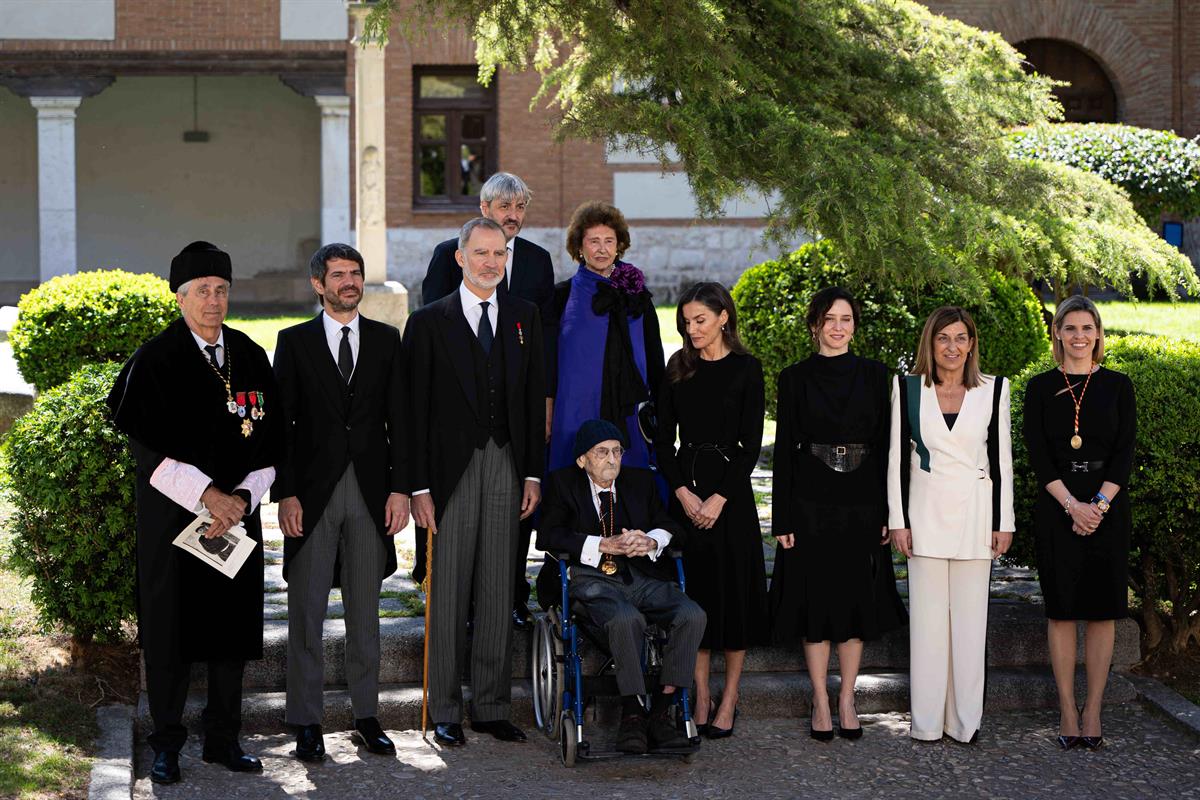The Minister for Culture attends the presentation of the Cervantes 2024 Prize to Álvaro Pombo, together with the King and Queen of Spain
News - 2025.4.23
 Group photo of the Cervantes 2024 Prize presentation ceremony, awarded to writer Álvaro Pombo
Group photo of the Cervantes 2024 Prize presentation ceremony, awarded to writer Álvaro Pombo
The writer Álvaro Pombo has received the 2024 'Miguel de Cervantes' Prize for Literature in Spanish from the King and Queen of Spain. The ceremony, which was held in the auditorium of the University of Alcalá, in Alcalá de Henares (Madrid), was also attended by the writer and professor, Mario Crespo, on behalf of the award-winning author, and the Minister for Culture, Ernest Urtasun. Numerous personalities from politics and culture were present at the ceremony.
The jury, which met on 12 November, awarded the prize to Álvaro Pombo for "his extraordinary creative personality, his singular lyricism and his original storytelling. In addition to his remarkable level as a poet and essayist, he is one of the great novelists of our language who investigates the human condition from the affective perspectives of deep and contradictory feelings."
The opinion also states that, in his creations, "he shows the world through the construction of a language in which the deformations of reality are reflected under the guise of irony and humour. In his prose, orality is reflected in the desire for a style that aspires to the Waldensian "I write as I speak". Álvaro Pombo has created that which defines great writers, an imperishable and indispensable literary world of his own that moves".
Cervantes Prize
The Cervantes Prize was awarded for the first time in 1976 to Jorge Guillén, and since then it has been awarded to a total of 48 authors. In 1979, the prize was awarded ex aequo to Jorge Luis Borges and Gerardo Diego. Since then, the order of convocation stipulates that the prize may not be divided, declared void or awarded posthumously.
The awarding of this prize, endowed with 125,000 euros, is an annual public testimony of admiration for the figure of a writer who, through their work as a whole, has contributed to enriching the Hispanic literary legacy.
The Cervantes Prize may be awarded to any author whose literary work is written entirely, or mostly, in Spanish. Candidates for the Prize are put forward by the Academies of the Spanish Language, authors who have won prizes in previous editions, institutions which, due to their nature, objectives or content, are linked to literature in the Spanish language, and by the members of the Jury.
Álvaro Pombo
Álvaro Pombo García de los Ríos was born in Santander in 1939. He holds a degree in Philosophy and Arts from the Complutense University of Madrid and a Bachelor of Arts in Philosophy from Birkbeck College, London. He has been a member of the Real Academia Española de la Lengua since 2004.
The author has an extensive career, with almost half a century of publications, including novels, short stories, articles in the press, essays and books of poetry.
His works include 'Protocolos' (1973), 'Variaciones' (1977), 'Relatos sobre la falta de sustancia' (1977), 'El parecido' (1979), 'Hacia una constitución poética del año en curso' (1977), 'El héroe de las mansardas de Mansard' (1983), 'El hijo adoptivo' (1984), 'Los delitos insignificantes' (1986), 'El metro de platinum iridiado' (1990), 'Protocolos para una rehabilitación del firmamento' (1992), 'Aparición del eterno femenino contada por S.M. el Rey' (1993), 'Donde las mujeres' (1996), 'Vida de San Francisco de Asís. Una paráfrasis' (1996), 'Cuentos reciclados' (1997), 'La cuadratura del círculo' (1999), 'El cielo raso' (2001), 'Una ventana al norte' (2004), 'La fortuna de Matilda Turpin' (2006), 'La previa muerte del lugarteniente Aloof' (2009), 'El gran mundo' (2015), 'La casa del reloj' (2016), 'Retrato del vizconde en invierno' (2018), 'El destino de un gato común' (2020), 'La ficción suprema. Un asalto a la idea de Dios' (2022) and 'El exclaustrado' (2024).
He has received different awards and distinctions such as the 13th Francisco Umbral Foundation Award for the best book of 2023, the 35th International Menéndez Pelayo Award in 2023 awarded by the Universidad Internacional Menéndez Pelayo, the Santander Honorífico de las Letras Award in 2018, the Nadal Award for 'El temblor del héroe' in 2018, the Planeta Award for 'La fortuna de Matilda Turpin' in 2006, the Salambó Award for 'Contra natura' in 2006, a work for which he also received the City of Barcelona Award in 2005, the 'El Correo' Journalism Award, for his article 'Viaje irreal a Bilbao' in 2006, the Journalism Award on Reading awarded by the Germán Sánchez Ruipérez Foundation for his article 'Libros nuevos y renuevos de abril' in 2004, the Fastenrath Award for 'La cuadratura del círculo' in 2001, the same year in which he was awarded the José Manuel Lara Foundation Award for 'El cielo raso', the City of Barcelona Award and the National Narrative Award for 'Donde las mujeres' in 1997, the Critics' Award for 'El metro de platino iridiado' in 1991, the Herralde Award for 'El héroe de las mansardas de Mansard' in 1983 and the El Bardo Poetry Award for "Variaciones" in 1977.
Jury
The jury, which met on 12 November, was chaired by Luis Mateo Díez, winner of the 2023 Cervantes Prize, and María José Gálvez, Director General of Books, Comics and Reading at the Ministry of Culture, acted as vice-president.
The jury was also made up of members Carme Riera, for the Royal Spanish Academy; Rosa Betty Muñoz, representing the Royal Chilean Academy of Language; Jaime Garau, for the Conference of Rectors of Spanish Universities (CRUE); Cuauhtémoc Pérez, for the Union of Latin American and Caribbean Universities (UDUALC); Luisa Castro, for the Cervantes Institute; Ángeles García, for the Federation of Associations of Journalists of Spain (FAPE); Benjamín Torres, for the Latin American Federation of Journalists (FELAP); Minni Swahney, for the International Association of Hispanists; Marta Sanz Pastor, for the Ministry of Culture; and Rafael Cadenas, the 2022 award-winning writer.
Non official translation




